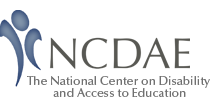Additional Resources for the Webcast on Electronic Accessibility in Library and Information Services
- Accessibility/usability of library indexes/databases
Ron Stewart, Vivek Narendra and Axel Schmetzke, "Accessibility and Usability of Online Library Databases," Library Hi Tech, 23(2), 2005: 265-286. An electronic version (possibly abridged) will soon be posted on the following website: http://tap.oregonstate.edu/research/.
- Accessibility/usability of e-journals
Soon to come. Findings will be posted on the following web site by the end of November:
http://tap.oregonstate.edu/research/. - Other up-to-date information sites specific to online library resources
- Web Accessibility Survey Site by Axel Schmetzke:
http://library.uwsp.edu/aschmetz/Accessible/websurveys.htm
See especially the section entitled "Accessibility of Online Library Catalogs, Indexes and Databases, and Other Library Resources" - Axel Schmetzke's Accessible Webpage Design: Resources Website: (http://library.uwsp.edu/aschmetz/Accessible/pub_resources.htm)
See especially the subsections specific to- Web access in the campus and library environment
- Accessibility in math and science
- Courseware accessibility, registration software and distance education
- Digital collections/repositories/depositories
- Electronic textbooks
- Google's library project
- Accessibility of PDF, Powerpoint and Flash
- Web Accessibility Survey Site by Axel Schmetzke:
- For accessible Web policies visit
http://library.uwsp.edu/aschmetz/Accessible/pub_resources.htm#Policy.
This includes subsections with policies pertaining to "Libraries" and "Libraries-Collection Development."
The University of Wisconsin-Stevens Point's new "Online Accessibility Policy" is posted at http://www.uwsp.edu/it/policies/accessibility/AccessibilityPolicy.htm. - The ACRL's document "Guidelines for Distance Learning Library Services," the current version of which does not address accessibility, is located at
http://www.ala.org/ala/acrl/acrlstandards/guidelinesdistance.htm. The guidelines are currently undergoing another revision cycle. If you wish to make your voice heard, contact, DLS Guidelines Committee Chair, Rob Morrison, at robmor@cc.usu.edu or 435-797-1477. Information about the revisions and opportunities on how to participate in this process will be posted to the ACRL Distance Learning Section (DSL) Website at http://caspian.switchinc.org/~distlearn/guidelines/. (DLS Guidelines Committee truly welcomes input.) This posting will also be announced at the AXSLIB-L forum (see below).
- AXSLIB-L discussion forum supported by EASI--for librarians to learn how to accommodate patrons with disabilities and to discuss questions pertaining to the accessibility of library resources.
To subscribe to the AXSLIB-L list, send an e-mail to listserv@maelstrom.stjohns.edu saying "sub axslib-l" followed by your first and last name (omit the quotation marks). Searchable AXLIB-L archives are located at http://maelstrom.stjohns.edu/archives/axslib-l.html.
- Suzanne Byerley and Mary Beth Chambers, "Accessibility of Web-based Library Databases: the Vendors' Perspectives." Library Hi Tech. 21(3) 2003: 347-357.
- Questions for index/database/e-journal vendors:
- What efforts has your company undertaken so far to make the pages of your product accessible to people with disabilities?
- Does your product comply with the W3C/WAI's Web Content Accessibility Guidelines (WCAG) and/or the Access Board Standards (Sect. 508, Rehab. Act Amendments of 1998)?
- With which of the commonly used screen readers has your product been tested?
- When your product was designed and evaluated for usability, did this include people with disabilities?
- When you come to our library to introduce your product, could you include a demonstration on how to conduct a search using a screen reader ?
- A recent research study (see above: #1 - #3) brought to light some usability issues that people with certain disabilities face when trying to use your product. What is your schedule for making (further) improvements concerning the accessibility of your product? Have these issues been resolved in the latest update of your product?
- Bell, L., & Peters, T. (2005). Digital library services for all. American Libraries, 36(8), 46-47.
- Walling, L. L. (2004). Educating students to serve information seekers with disabilities. Journal of Education for Library and Information Science, 45(2), 137-148.
- Other online resources

